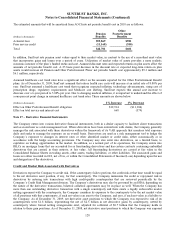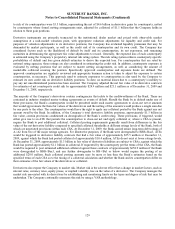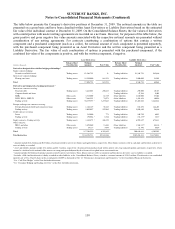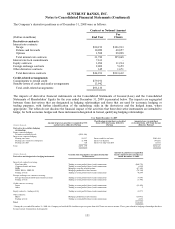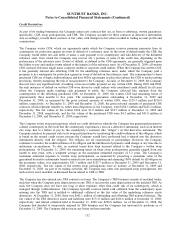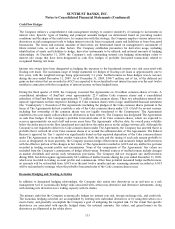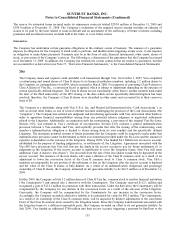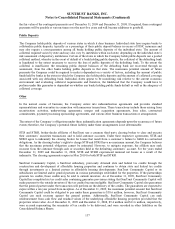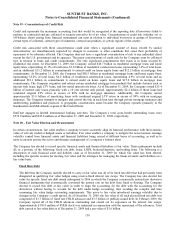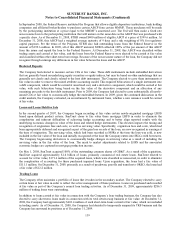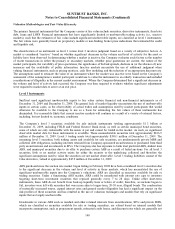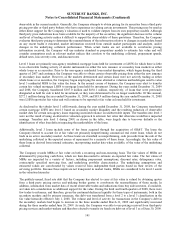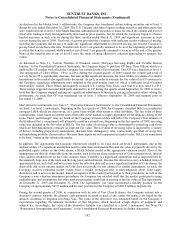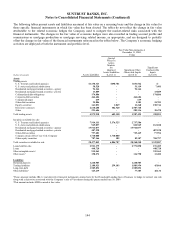SunTrust 2009 Annual Report Download - page 153
Download and view the complete annual report
Please find page 153 of the 2009 SunTrust annual report below. You can navigate through the pages in the report by either clicking on the pages listed below, or by using the keyword search tool below to find specific information within the annual report.
SUNTRUST BANKS, INC.
Notes to Consolidated Financial Statements (Continued)
the fair value of the contingent payments as of December 31, 2009 and December 31, 2008. If required, these contingent
payments will be payable at various times over the next five years and will become additions to goodwill.
Public Deposits
The Company holds public deposits of various states in which it does business. Individual state laws require banks to
collateralize public deposits, typically as a percentage of their public deposit balance in excess of FDIC insurance and
may also require a cross-guarantee among all banks holding public deposits of the individual state. The amount of
collateral required varies by state and may also vary by institution within each state, depending on the individual state’s
risk assessment of depository institutions. Certain of the states in which the Company holds public deposits use a pooled
collateral method, whereby in the event of default of a bank holding public deposits, the collateral of the defaulting bank
is liquidated to the extent necessary to recover the loss of public deposits of the defaulting bank. To the extent the
collateral is insufficient, the remaining public deposit balances of the defaulting bank are recovered through an
assessment, from the other banks holding public deposits in that state. The maximum potential amount of future
payments the Company could be required to make is dependent on a variety of factors, including the amount of public
funds held by banks in the states in which the Company also holds public deposits and the amount of collateral coverage
associated with any defaulting bank. Individual states appear to be monitoring risk relative to the current economic
environment and evaluating collateral requirements and therefore, the likelihood that the Company would have to
perform under this guarantee is dependent on whether any banks holding public funds default as well as the adequacy of
collateral coverage.
Other
In the normal course of business, the Company enters into indemnification agreements and provides standard
representations and warranties in connection with numerous transactions. These transactions include those arising from
securitization activities, underwriting agreements, merger and acquisition agreements, loan sales, contractual
commitments, payment processing sponsorship agreements, and various other business transactions or arrangements.
The extent of the Company’s obligations under these indemnification agreements depends upon the occurrence of future
events; therefore, the Company’s potential future liability under these arrangements is not determinable.
STIS and STRH, broker-dealer affiliates of SunTrust, use a common third party clearing broker to clear and execute
their customers’ securities transactions and to hold customer accounts. Under their respective agreements, STIS and
STRH agree to indemnify the clearing broker for losses that result from a customer’s failure to fulfill its contractual
obligations. As the clearing broker’s rights to charge STIS and STRH have no maximum amount, the Company believes
that the maximum potential obligation cannot be estimated. However, to mitigate exposure, the affiliate may seek
recourse from the customer through cash or securities held in the defaulting customers’ account. For the years ended
December 31, 2009 and December 31, 2008, STIS and STRH experienced minimal net losses as a result of the
indemnity. The clearing agreements expire in May 2010 for both STIS and STRH.
SunTrust Community Capital, a SunTrust subsidiary, previously obtained state and federal tax credits through the
construction and development of affordable housing properties and continues to obtain state and federal tax credits
through investments as a limited partner in affordable housing developments. SunTrust Community Capital or its
subsidiaries are limited and/or general partners in various partnerships established for the properties. If the partnerships
generate tax credits, those credits may be sold to outside investors. As of December 31, 2009, SunTrust Community
Capital has completed six tax credit sales containing guarantee provisions stating that SunTrust Community Capital will
make payment to the outside investors if the tax credits become ineligible. SunTrust Community Capital also guarantees
that the general partner under the transaction will perform on the delivery of the credits. The guarantees are expected to
expire within a ten year period from inception. As of December 31, 2009, the maximum potential amount that SunTrust
Community Capital could be obligated to pay under these guarantees is $38.6 million; however, SunTrust Community
Capital can seek recourse against the general partner. Additionally, SunTrust Community Capital can seek
reimbursement from cash flow and residual values of the underlying affordable housing properties provided that the
properties retain value. As of December 31, 2009 and December 31, 2008, $9.4 million and $11.6 million, respectively,
were accrued representing the remainder of tax credits to be delivered, and were recorded in other liabilities on the
Consolidated Balance Sheets.
137



